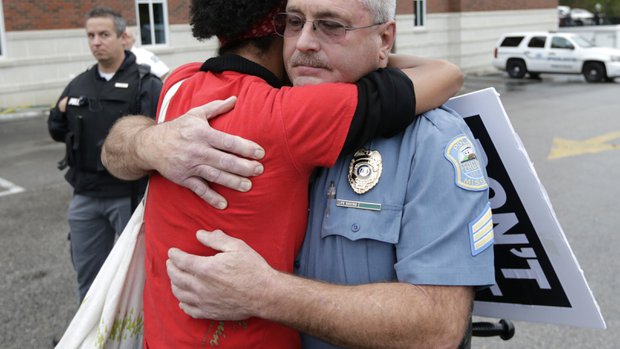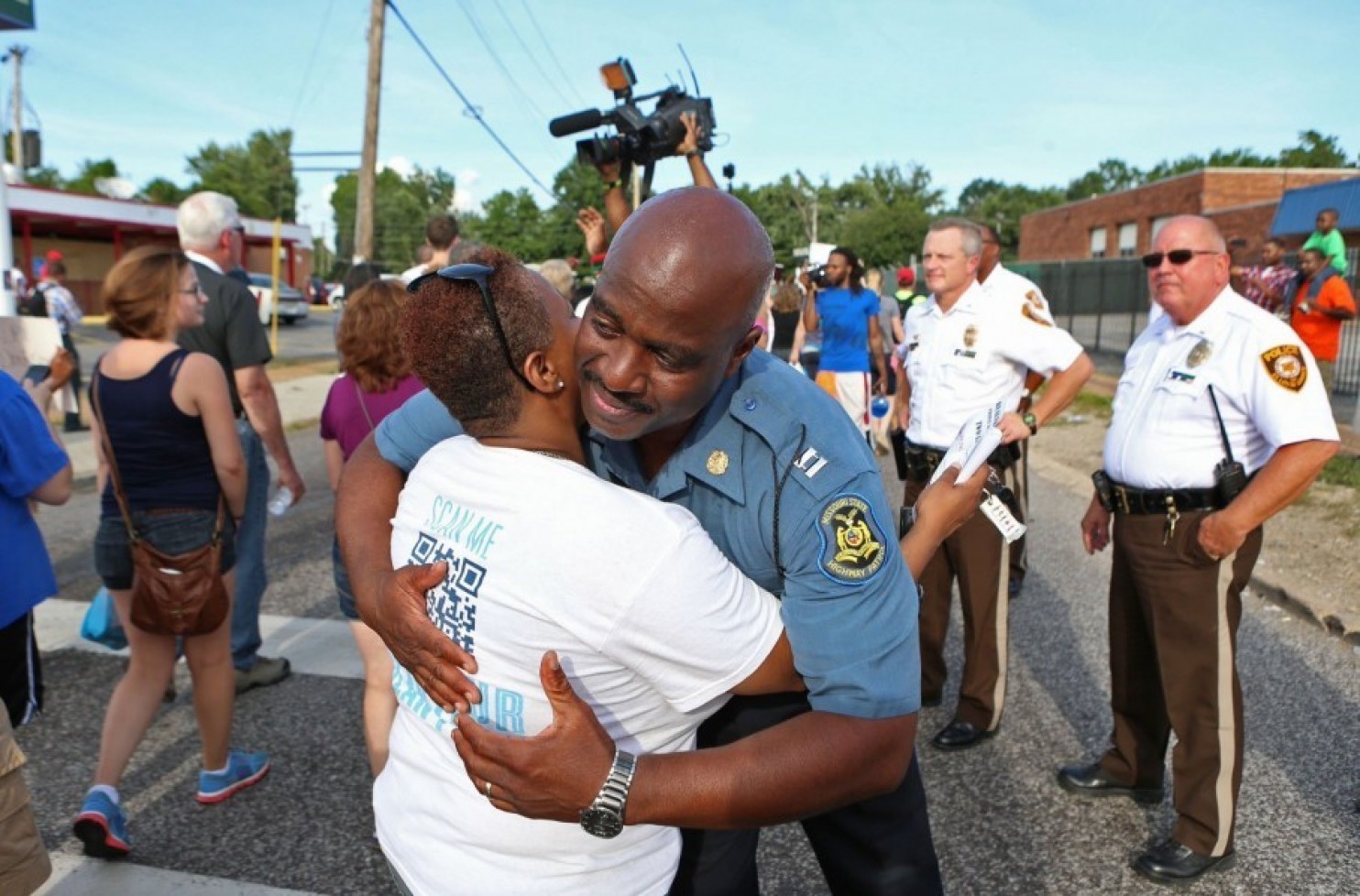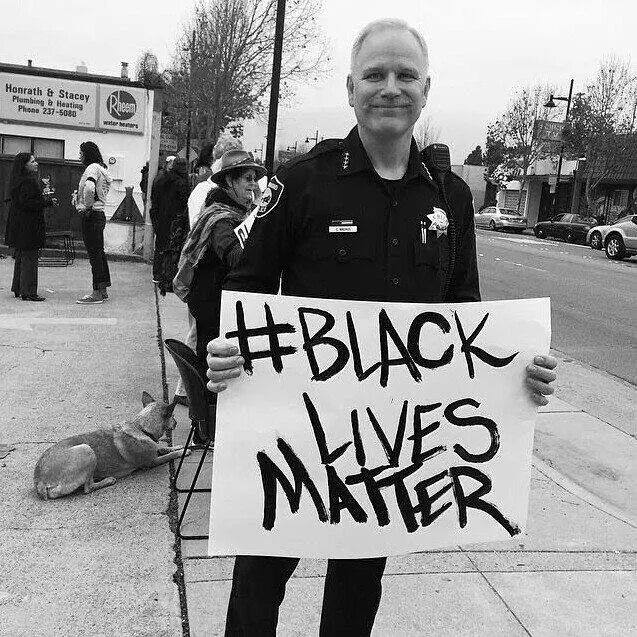A Flood of Fear: Ferguson to Richmond
It’s not a good day to be a police officer in America.
Michael Brown. Tamir Rice. Eric Garner. Now Rumain Brisbon, and I’m almost certainly missing more names than I’d care to think about.
Too much death. Too much horror, tragedy, blood. You can’t help but get some on you, just by wearing the uniform. You didn’t kill anybody, but when you put it on, you’re not Bill or Jane or Tariq or Wei Lun: you’re a cop. And cops killed those people.
Most police officers are good people. They’re kind of dick-ish people, because the job attracts that sort and they’ve seen some real shit, man, and you’ve got to be emotionally tough and forceful to do the work. But they’re good. They want to help. They try their best to do a tough job. They believe in justice.
Many of them probably look at Darren Wilson and slowly shake their heads. Some of what’s rattling around in there is disbelief and condemnation. How could he have let this happen?
But some of it is sympathy, and rejection of what could all too easily be their own fate.
“Not me,” they pray. “Please, don’t let it ever be me.”
Police officers aren’t some different category of being from you or me. Tomorrow morning, one of us - if physically able - could go down to the police academy, apply, and join their ranks. We’d have the vest. We’d have the badge. We’d have the gun.
And we’d have the duty: to uphold the law, as best we could with the tools we’d been given.
I think about what tools I would want, if it were me. I’d walk out my door in the morning, wearing a target. My neighbors are pretty nice, so I don’t think they’d be gunning for me, but you never know when somebody’s having a bad day and all they see is the uniform. I’d definitely want the vest.
And then…? I’d spend the rest of my day confronting people, because when you’re wearing the badge, every question is an accusation. I’d want to know how to soften that, to know how not to be fighting, all day, every day, every time I opened my mouth. I’d want to be able to reassure people that I was there to help.
I'd want to know how to help them not be afraid.
I imagine the moment when words would not be enough. There are times when it's my job to take someone to jail, and there are no right words. My heart is racing; adrenaline is pumping. I’m ready for a fight, because it looks like that’s what’s coming. I don’t want to get hurt. I want to go home to my family tonight. I’ve got a wife, and three little kids. Doesn’t matter if the other person is six-four or four-six: if they’ve got a gun, I’m in mortal danger. And even if they didn't, because of the job, I brought a gun, so if we get into fisticuffs and they ring my bell, it's suddenly their gun. Just by showing up in uniform, I've escalated this to a possible life-or-death struggle.
Right now, Death is very close, running chill fingers through my hair, whispering, beckoning…
So I would want to be able to tell him to shut the hell up and go away. I would want to be able to face that fear and do my job and go home. Because my job is not to kill this person. It is my job not to kill this person. I am a police officer, not an executioner.
But things are bad, now. I am scared. I don’t have the luxury of waiting to make a choice, and my decision right now may mean that my kids never see me again.
I imagine this, and I just… I don’t know. I don’t know what I want, except never to be here. What tool helps me here? A taser? Pepper spray? Some option other than a bullet? You can’t ask me to die right now.
How do I trust that I will live through this, if I don’t shoot right this second?
That’s the tool I want. I want the answer to that question. I want to know how we can ask anyone to do this job, one that can be filled with existential terror at any moment, and expect them to make good choices. How to choose life, instead of death?
We are asking normal people, like you or me, to be in an impossible situation. To face death, but not to choose it. To know that there is an easy answer when they are truly afraid for their lives, but not to use it. To know that there is a way that promises their kids get to see them again, but to leave it in their holster.
That's what I'd need if I were a police officer: the knowledge of something better than fear, and the compassion to help others find the same. That's what we need more than body cameras: soothing voices. Patience. Kindness. Sympathy in the face of anger. And a system of support for police officers that helps mitigate their fear, that acknowledges their human weaknesses.
The good news is, it appears that we can give police officers the tools they need.
Witness the police department in Richmond, California, which hasn't killed anyone in their community of 100,000 people since 2007. It feels weird to write that like it's a huge accomplishment, but apparently it is. The police chief, Chris Magnus, has prioritized community policing and extensive training for his officers, and it's made a difference.
Police in Richmond are in their communities. They know the Michael Browns, the Tamir Rices. They also know that if they kill anybody, the chief is going to take it seriously. But more than fear of the chief and affection for their neighbors, they have the training - the constant, continued training - that teaches them how they can go into violence when they must and bring everyone out the other side.


I have been trying to write this story for a week now. Every time I sat down and read it again, I felt awful. Like a phony. Oh, the poor, terrified police officers with their guns and their vests and their legal system that tells them they do no wrong. Poor them! Their fear is a problem, yes, but it's not the problem. If I would have hit the publish button, all I would have been telling you would be the lies inside my own head. My own fears. My own hopelessness in the face of horror.
Because I got the story wrong, too. Just now, I took you with me, down the wrong path. I could have rewritten it all, but I wanted to let it stand.
It's not about taking away police officers' fear. It's about giving them something better to believe in. It's about investing them in life.
I should have known better. Stories are supposed to help us. They're supposed to teach us how to be better. They're supposed to help us find our happy endings. But they can trap you, not let you see your way out of them. They can blind you, just like they blinded Darren Wilson. But here's the point:
We can choose a new story. Always.
That's what Chris Magnus did in Richmond. He took the old story about a war on crime and he got rid of it. He told the story of the police officer who works for the people, not against them. He knew the fears that his people would face and he helped prepare them to face those fears, so that they could tell his story to their communities through word and deed. He didn't just fix the problem. He fixed the way that his officers and everyone in his city thought about the problem. He literally made history.
I'm not going to pretend like I've got anything to say about how. But I believe that the story can change. We can do more than just fix the problems in the justice system and the police force and in lower-income neighborhoods. We can change the narrative from problems to solutions, from conflict to community.
It will take courage. And maybe a few free hugs.

